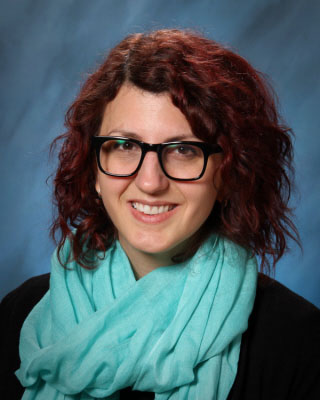
Koty Zelinka Cole
Like many educators who use Echoes and Reflections to teach about the Holocaust, Koty Zelinka Cole first heard about the program through a colleague. Now, she is the one recommending it to other educators who are looking for resources to help them teach the Holocaust and World War II.
Cole teaches the Holocaust in her 9th and 10th grade language arts classes. After a colleague who uses IWitness forwarded an email about an upcoming Echoes and Reflections online professional development course, Cole jumped at the chance to participate.
I am always up for continuing ed and this is an area I'm especially passionate about,” Cole said. “Also, free was a very good price!”
Echoes and Reflections is a partnership between USC Shoah Foundation, Yad Vashem and Anti-Defamation League. It includes 10 lessons that include everything educators need to teach the Holocaust, including survivor testimony clips, primary source documents and discussion questions. Its free online professional development courses each month introduce educators to the entire program.
Cole said she appreciates how the Echoes and Reflections curriculum covers every aspect of the Holocaust, not just the concentration camps and death camps. She found the emphasis on the history of anti-Semitism especially helpful and complementary to other trainings she’s attended on the subject.
“I also appreciate how the course began with some self-inventories for educators regarding why we think Holocaust education is important,” Cole said. “It was good to reflect on my pedagogy before learning new material so I could really see how the lessons could fit in with my personal teaching framework.”
Though Cole was fortunate to have a survivor come and speak at her school last year, she recognizes that such opportunities are difficult to schedule and becoming less frequent. She said she is grateful for the time that USC Shoah Foundation has spent recording and preserving survivor testimonies – which will soon be our only option for listening to first-person stories about the Holocaust.
Teaching about the Holocaust is a step toward making sure the world does not make the same mistakes again, Cole said. But as current events demonstrate – such as Syrians’ new social media hashtag “#HolocaustAleppo” – it’s clear there is still a lot of work to do.
“This is a dire reminder of how we still have a lot to learn and change in the world to prevent genocide,” Cole said.
Cole said she would definitely recommend this professional development experience to any educator who teaches about the Holocaust or World War II.
“It was a well-organized course, self-paced (for the most part) and had practical ideas you could use right away in the classroom,” she said.